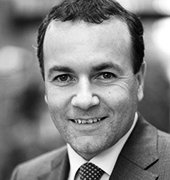Past Event
Spitzenkandidaten series: Manfred Weber
The fifth event in the The Road to Europe - Brussels Briefing Live: Spitzenkandidaten series. The series features the lead candidates for the European Elections of six parties and is jointly organised by Bruegel and the Financial Times in March and April 2019.
video & audio recordings
summary
In the fifth event of the Spitzenkandidaten series co-hosted by Bruegel and the Financial Times, Manfred Weber discussed his platform as European People’s Party (EPP) candidate for the European Commission President. The interviewers for the event were Bruegel Director, Guntram Wolff and Financial Times Paris Bureau Chief Anne-Sylvain Chassany.
Weber highlighted the historical relevance of the incoming elections. Amongst multiple sources of uncertainty (politics, technological progress, environment), citizens are called to set the direction of European politics, pending between embracing a shared destiny and returning to nationalisms. This is why, while the past decade has mostly been about crisis-management, the next decade of EU politics must be inspired by long-term and optimistic vision, fueled by pride for the positive results achieved in terms of growth and employment since the crisis across Europe.
A priority signaled by Weber is the activation of money for growth and investment. With this respect, the EU would need a few flagship projects, with the ability to couple economic return with symbolic value, such as research on cancer or, picking up a suggestion coming from the audience, the establishment of a European clouding system. While emphasizing the need of channeling private savings into productive investment, Weber strongly refused the idea that taking on more public debt could lead to sustainable growth. Accordingly, room for growth has to be found in the enlargement of the scope of the single market, the backbone of the European economic structure.
Weber took a clear stance on geopolitical matters, underlining how the EPP is the only political group unambiguously in favour of free trade agreements and arguing that Europe should bring its naivety vis-à-vis foreign (and in particular Chinese) investments to an end. Competition rules should be amended accordingly, in order to allow for the development and protection of European champions (such as Airbus in the past) in sectors considered as strategic. Similarly, a commitment to multilateralism should not prevent Europe from taking stock of the changing international environment and protect itself from undesired developments. The establishment of a European Monetary Fund would be a step in the direction of greater autonomy and independence, and would be a component of a strategy to complete the banking union, along with a revision of the current, at times cumbersome, regulation and the stabilization of the banking sector. A European Monetary Fund, however, would not be needed to oversee EU fiscal rules since the European Commission is suited for the task as an elected political body.
The political role of the Commission should be strengthened also when dealing with the disbursement of regional funds, that in Weber’s opinion could be conditional on the respect of the rule of law, to be assessed by a neutral body focusing on corruption, judiciary and media freedom. This concern with the respect of the fundamental freedom was proved, according to Weber, by the recent EPP’s suspension of Orban’s membership. In order to allow for bolder decisions in the realm of taxation, Weber also suggested that the unanimity rule might be suspended in special cases (such as the taxation of digital giants), although the general principle of competition, on tax systems too, must be preserved.
The meeting concluded on the least surprising of topics, Brexit. The EPP spitzenkandidat argued that prolongation should be granted only conditionally on clarifications on the future relationship, with a commitment from the British side not to affect any decision about the future of the EU.
Notes by Jan Mazza
This event is a part of a series of talks and debates with Europe’s Spitzenkandidaten and political leaders. Journalists from the FT, along with a Bruegel Director or a senior scholar, explore and challenge the main political parties’ policies for the future of the continent in front of an invited audience. The events are livestreamed on the Bruegel website. For more events, see here.
Schedule
12:30-13:00
Check-in and lunch
13:00-14:15
Conversation
Anne-Sylvaine Chassany, Paris Bureau Chief, Financial Times
Manfred Weber, Chair of the EPP Group, European Parliament
Guntram B. Wolff, Former Director
14:15-14:30
Q&A
14:30
End
Speakers
Anne-Sylvaine Chassany
Paris Bureau Chief, Financial Times

Manfred Weber
Chair of the EPP Group, European Parliament

Guntram B. Wolff
Former Director
Location & Contact
Matilda Sevon
[email protected]







